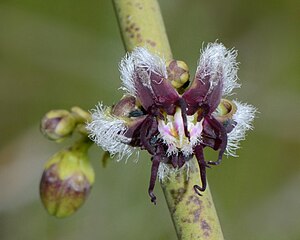Note: This is a project under development. The articles on this wiki are just being initiated and broadly incomplete. You can Help creating new pages.
Periploca aphylla
Periploca aphylla is a genus of plants in the family Apocynaceae. It is first described for modern science by Linnaeus in 1753. It is native to Europe, Asia, and Africa.
Contents
- 1 Uses
- 2 Parts Used
- 3 Chemical Composition
- 4 Common names
- 5 Properties
- 6 Habit
- 7 Identification
- 8 List of Ayurvedic medicine in which the herb is used
- 9 Where to get the saplings
- 10 Mode of Propagation
- 11 How to plant/cultivate
- 12 Commonly seen growing in areas
- 13 Photo Gallery
- 14 References
- 15 External Links
Uses
Swollen joints, Cough, Flu, Ulcer.
Parts Used
Chemical Composition
Periploca species revealed predominant metabolites, such as steroids, carbohydrates, terpenoids, phenylpropanoids, flavonoids, quinones, and aromatics.[1]
Common names
| Language | Common name |
|---|---|
| Kannada | |
| Hindi | |
| Malayalam | |
| Tamil | |
| Telugu | |
| Marathi | NA |
| Gujarathi | NA |
| Punjabi | NA |
| Kashmiri | NA |
| Sanskrit | Soma |
| English | Leafless Silkflower Shrub |
Properties
Reference: Dravya - Substance, Rasa - Taste, Guna - Qualities, Veerya - Potency, Vipaka - Post-digesion effect, Karma - Pharmacological activity, Prabhava - Therepeutics.
Dravya
Rasa
Guna
Veerya
Vipaka
Karma
Prabhava
Habit
Identification
Leaf
| Kind | Shape | Feature |
|---|---|---|
| Simple | Ovate-oblong | 6-7 mm long, Pointed, Thick, Nerve obscure. |
Flower
| Type | Size | Color and composition | Stamen | More information |
|---|---|---|---|---|
| Bisexual | Ovalate | Greenish outside, Dark purple | 1.2-2.5 cm long cymes on thick flower-cluster-stalks, fragrant. |
Fruit
| Type | Size | Mass | Appearance | Seeds | More information |
|---|---|---|---|---|---|
| Simple Fruit | Ovoid | 2.5 cm long | Seedpods are 5-10 cm x 5-6 mm, rigid woody, widely divergent, pointed. Seeds are 6-6.5 mm long, oblong, compressed. | {{{6}}} |
Other features
List of Ayurvedic medicine in which the herb is used
Where to get the saplings
Mode of Propagation
How to plant/cultivate
Periploca linearifolia usually forms a tangled mass on top of shrubs and small trees. It flowers mainly during the rainy season; fruits remain on the plant for an extended period of time. The average 1000-seed weight is 7.1 g.[3]
Commonly seen growing in areas
Photo Gallery
References
External Links
- Ayurvedic Herbs known to be helpful to treat Swollen joints
- Ayurvedic Herbs known to be helpful to treat Cough
- Ayurvedic Herbs known to be helpful to treat Flu
- Ayurvedic Herbs known to be helpful to treat Ulcer
- Herbs with Flower used in medicine
- Herbs with Stem used in medicine
- Herbs with common name in Sanskrit
- Herbs with common name in English
- Habit - Herbs
- Index of Plants which can be propagated by Seeds
- Herbs that are commonly seen in the region of Lowland forest
- Herbs
- Apocynaceae

